Advanced Analytics for Qntrl
Gain deeper visibility into your process management data with the Qntrl - Zoho Analytics integration. This integration automatically syncs your Qntrl data into Zoho Analytics, enabling you to analyze process performance, track bottlenecks, and measure key metrics through insightful reports and dashboards. Combine Qntrl data with information from other business apps to get a unified view of your organizational workflows and make data-driven decisions with ease.
In this Page
- Setup
- Data Sync Frequency
- Modules and Fields
- Data Synchronization Failure between Qntrl and Zoho Analytics
- Manage Data Source - Qntrl
- Data Modelling and Preparation
- Visualize your Qntrl Data
- Sharing and Collaboration
Setup
Users with Administrator Privileges can configure the connection between Qntrl and Zoho Analytics.
Note: This integration is supported for the V3 of the Qntrl application.
- From the Zoho Analytics home page, click Import your Data.
- All the data sources will be listed. Access the Custom Solutions tab and choose Qntrl.
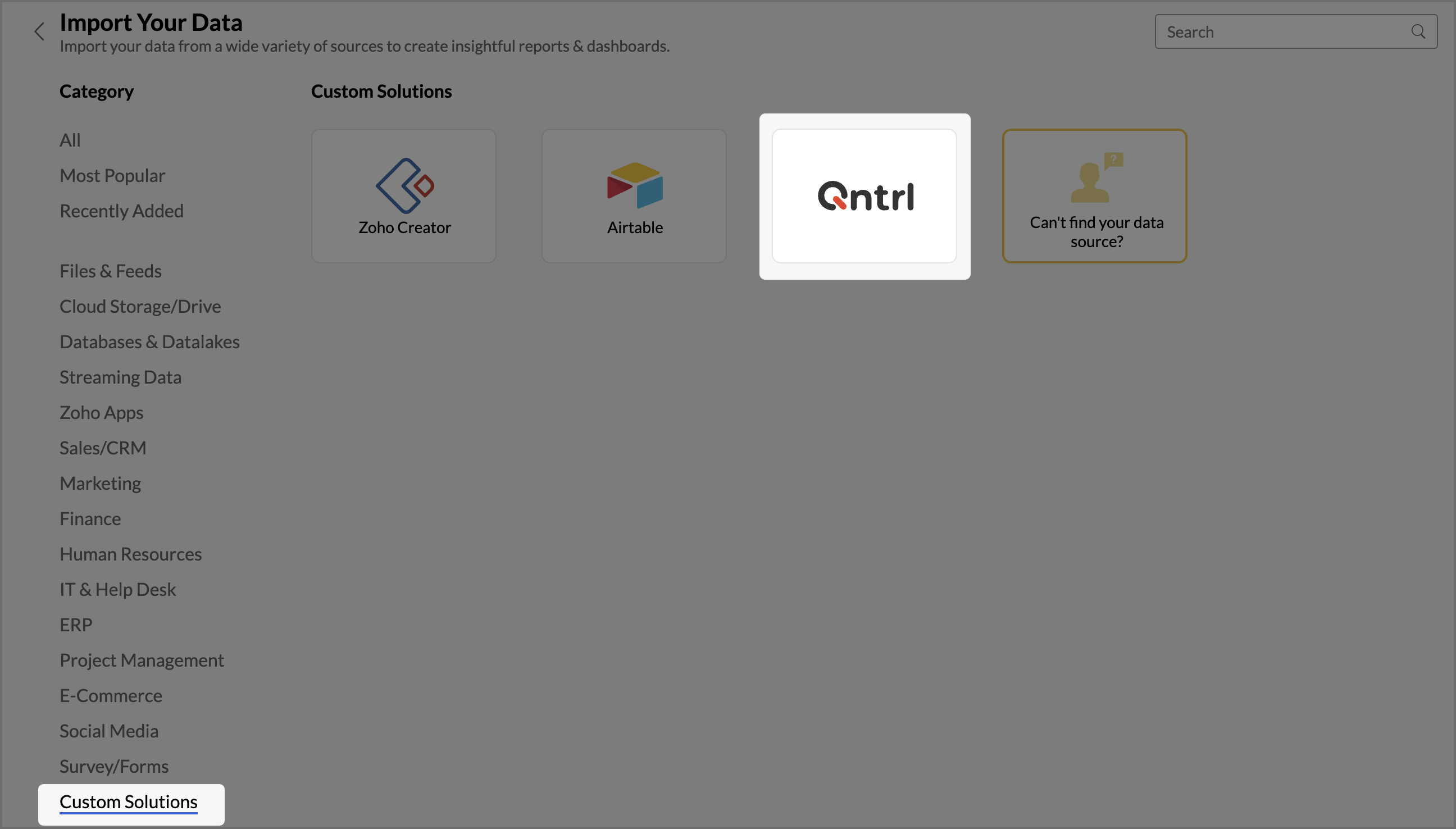
- Qntrl Advanced Analytics setup will open. Click Next to proceed.
- Specify a unique Workspace Name and Description.
- All the Qntrl organizations are fetched and listed here using single sign-on.
- Choose the Organization from which you intend to import the data.
- Select the Modules and Fields.
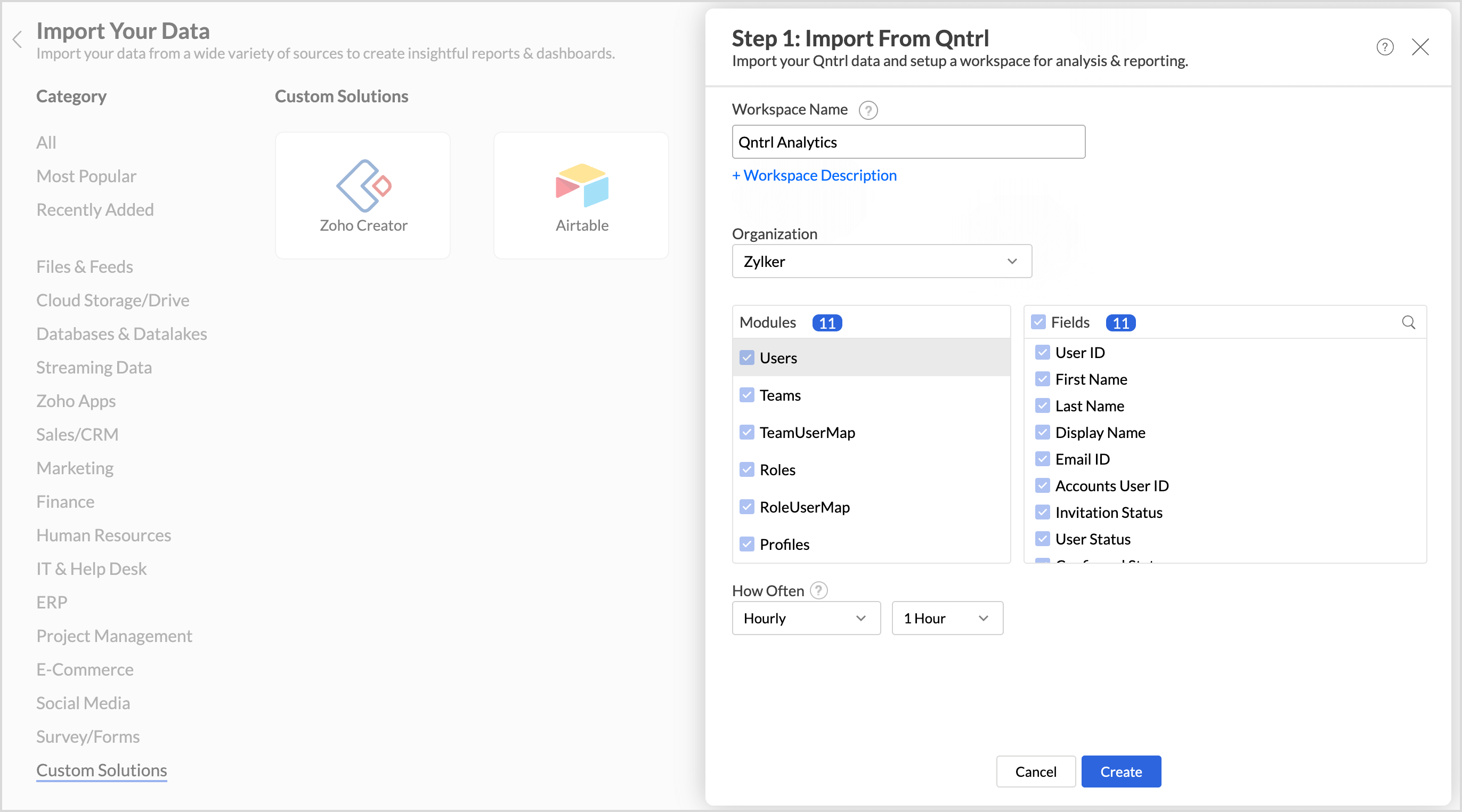
- From the How Often section, choose the interval in which the data should be synced. Refer to the Data Sync Frequency section to learn more.
- Click Create. Import will be initiated.
Note:
- The initial fetch might take a few minutes depending on the volume of the data to be imported. An email and an in-app notification will be sent once the initial fetch is complete.
- The setup process can sometimes fail for a variety of reasons. In this case, we request you to access the Data Sources tab and click the Retry link to import again. If the issue persists, write to support@zohoanalytics.com
Data Sync Frequency
Zoho Analytics offers flexible sync schedules to ensure that your data is always up-to-date for effective analysis. These schedules allow you to automate the process of updating your data, ensuring that your analyses are based on the latest information.
- 1 Hour (Enterprise plan only)
- 3 Hours(Standard plan and above)
- 6 Hours (Standard plan and above)
- 12 Hours (Standard plan and above)
- Every day
Modules and Fields
| Modules | Fields |
| Users | User ID, First Name, Last Name, Display Name, Email ID, Accounts User ID, Invitation Status, User Status, Confirmed Status, Created On, Modified On |
| Teams | Team ID, Team Name, Email Alias, Created By, Modified By, Created On, Modified On |
| TeamUserMap | Team ID, User ID |
| Roles | Role ID, Role Name, Created By, Modified By, Created On, Modified On |
| ProfileUserMap | Profile ID, User ID |
| Blueprint | Board ID, Process ID, Process Name, Created By, Modified By, Created On, Modified On |
| Stages | Stage ID, Stage Name, Created On, Modified On, Created By, Modified By |
Data Synchronization Failure between Qntrl and Zoho Analytics
Data Synchronization can fail due to any of the following reasons:
- Authentication Failure
- Connection Error
- Insufficient Permissions
- Modules and fields selected for analysis are deleted in the Qntrl Application.
In any of the above mentioned cases, the data sync will be paused. You will be notified via email and in-app notification with the exact reason for failure along with the solution.
Refer to Data Sync failure and solutions article for more details.To resolve the sync failure, delete or restructure the views, or restore the specific modules and fields from the source application.
Once you have made the changes, click the Sync now option to resume the data sync. If the issue persists, contact support@zohoanalytics.com.
Manage Data Source - Qntrl
The Data Sources tab provides essential information to monitor and manage the integration setup. It also allows you to edit the settings as needed. Users with administrator privileges will be able to view and modify the connection settings.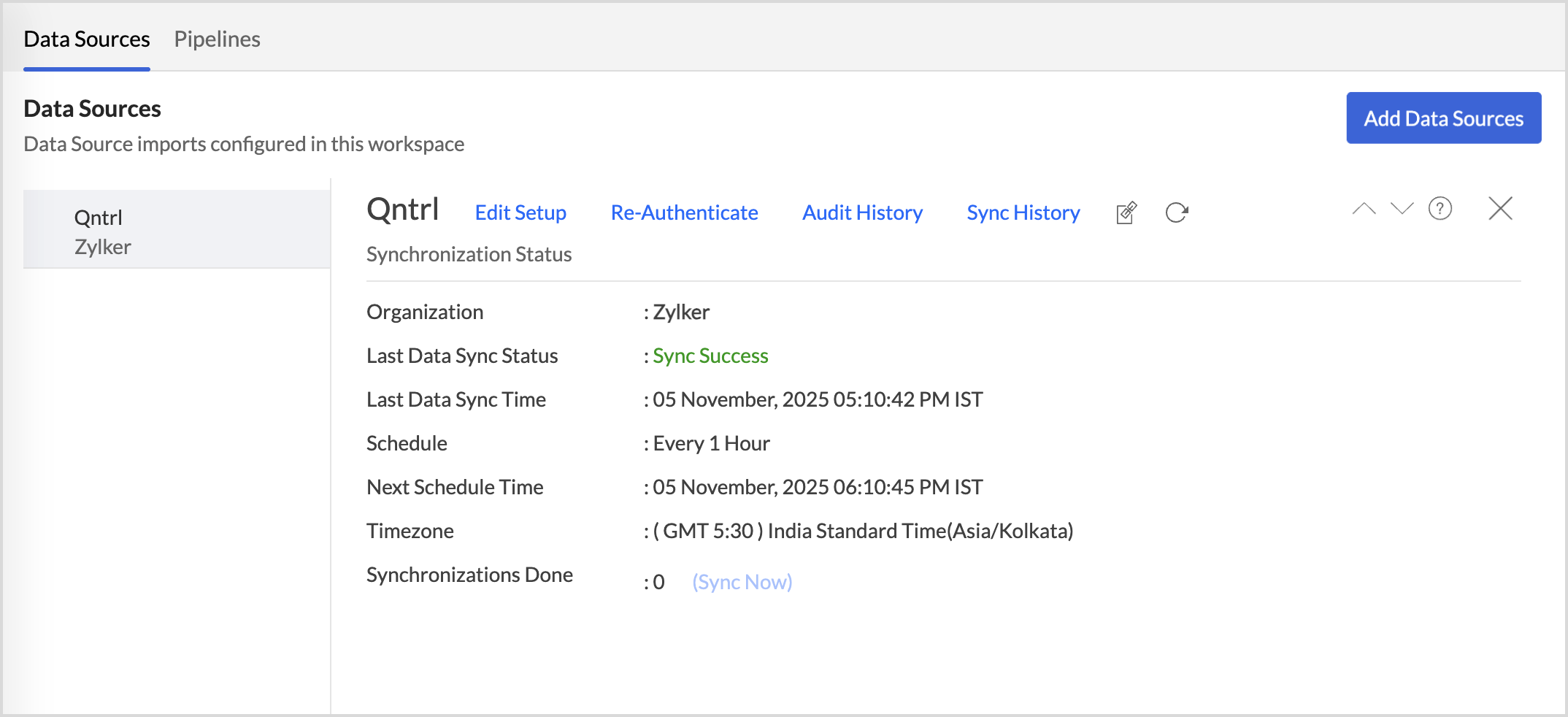
Edit Setup
The Edit Setup tab allows you to add or delete modules or fields, change the schedule interval, and modify other settings specific to the business application.
To modify the settings,
- Click Data Sources > Edit Setup.
- The Edit Setup - Qntrl dialog will open. Modify the settings as needed and click Save.
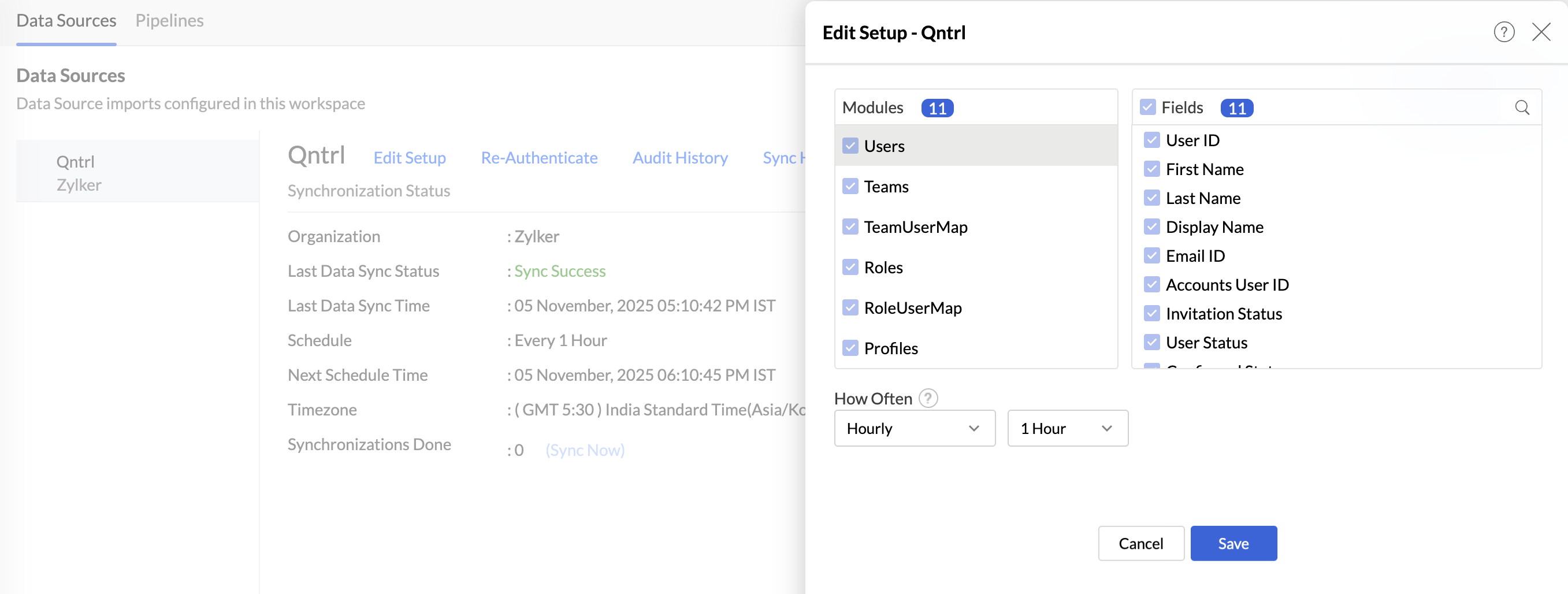
Re-Authenticate
Re-authentication will be helpful when the API key or password is changed. In this case, the data sync will be paused, and the administrators must re-authenticate to resume the data sync.
Sync History
The Sync History tab provides details about the data sync for the last 45 days. A successful data sync is marked in green, and a sync failure is marked in red.
To view the sync history,
- Click Data Sources > Sync History.
- A calendar with the Sync History of the last 45 days will open. The date when the data sync has happened will be highlighted. Hover to view the number of times the data had been synced on a specific date.
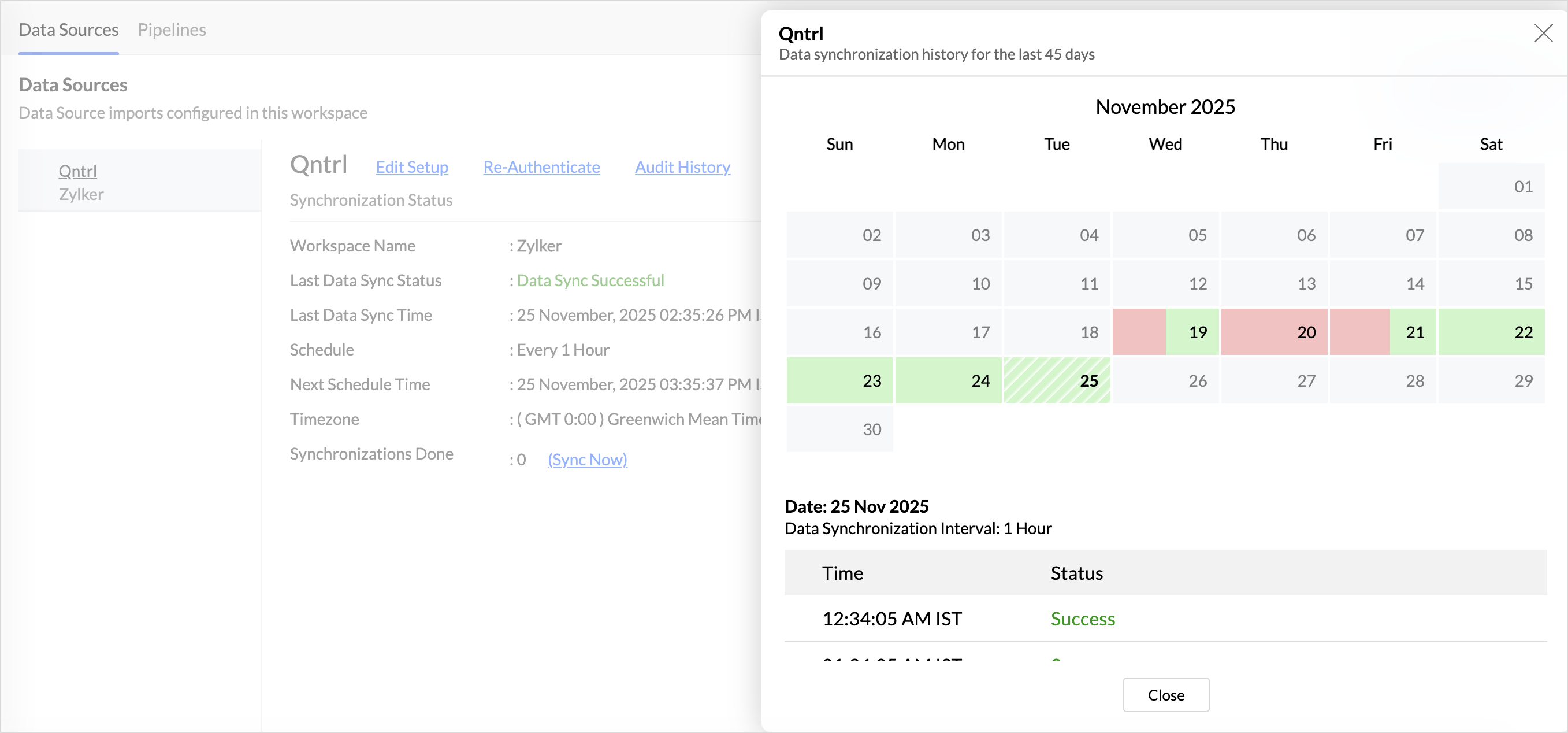
- Click the date to view more details. Time - Displays the time when the data is synced.Status - Shows whether the sync was a success or a failure.In case of failure, the reason will be displayed. Refer to resolving sync failures article to learn how to resolve the issue and avoid further failure.
Audit History
Zoho Analytics logs all the user activities and system events within the workspace. The following actions are logged in Zoho Analytics.
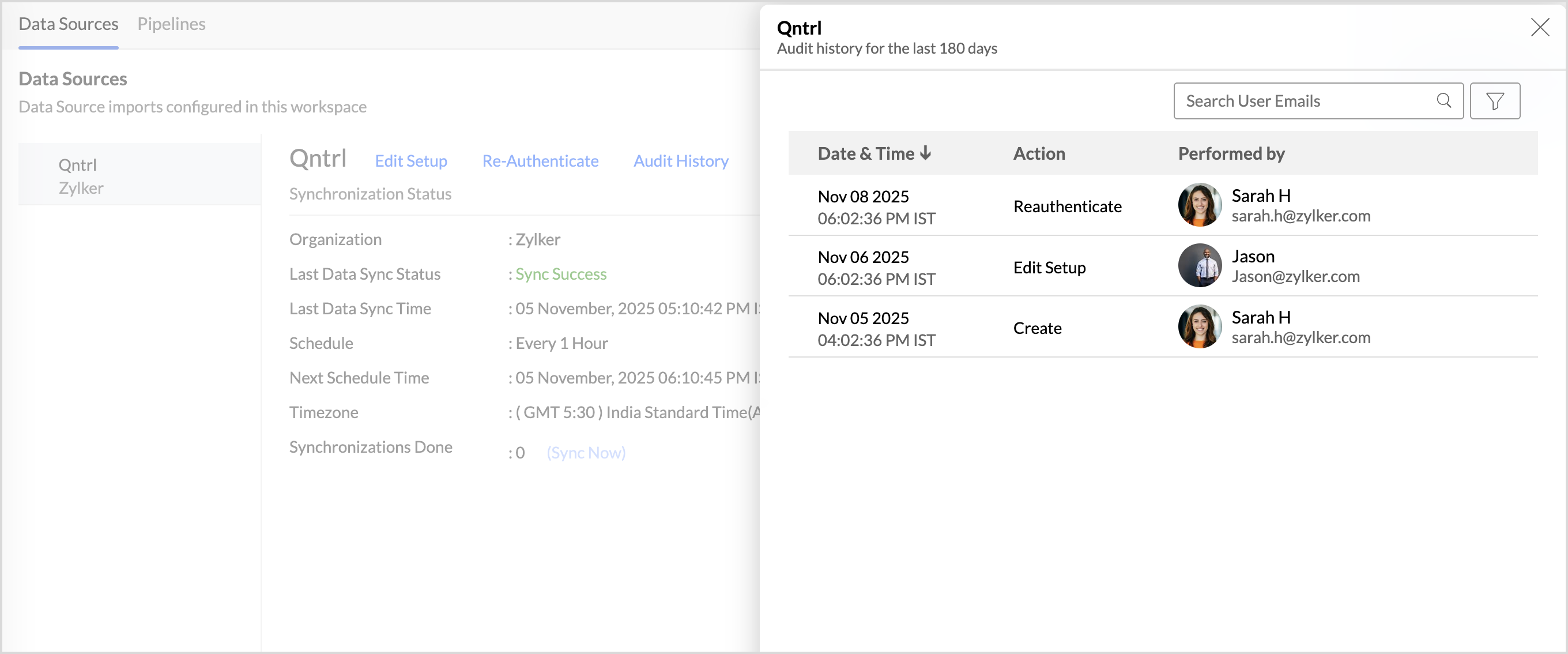
User Action: Create, Modules Added, Modules Removed, Fields Added, Fields Removed, Schedule Change and Entities Modified, Delete, Take Ownership, Re-authenticate, Sync Now, Retry.
System Action: Plan upgrade or downgrade.
Remove Data Source
Zoho Analytics allows you to remove the integration if needed. Removing the integration will suspend further data synchronization. The data tables and the reports will be available.
Click the Settings icon in the Data Sources tab, and select Remove Data Source from the drop-down menu.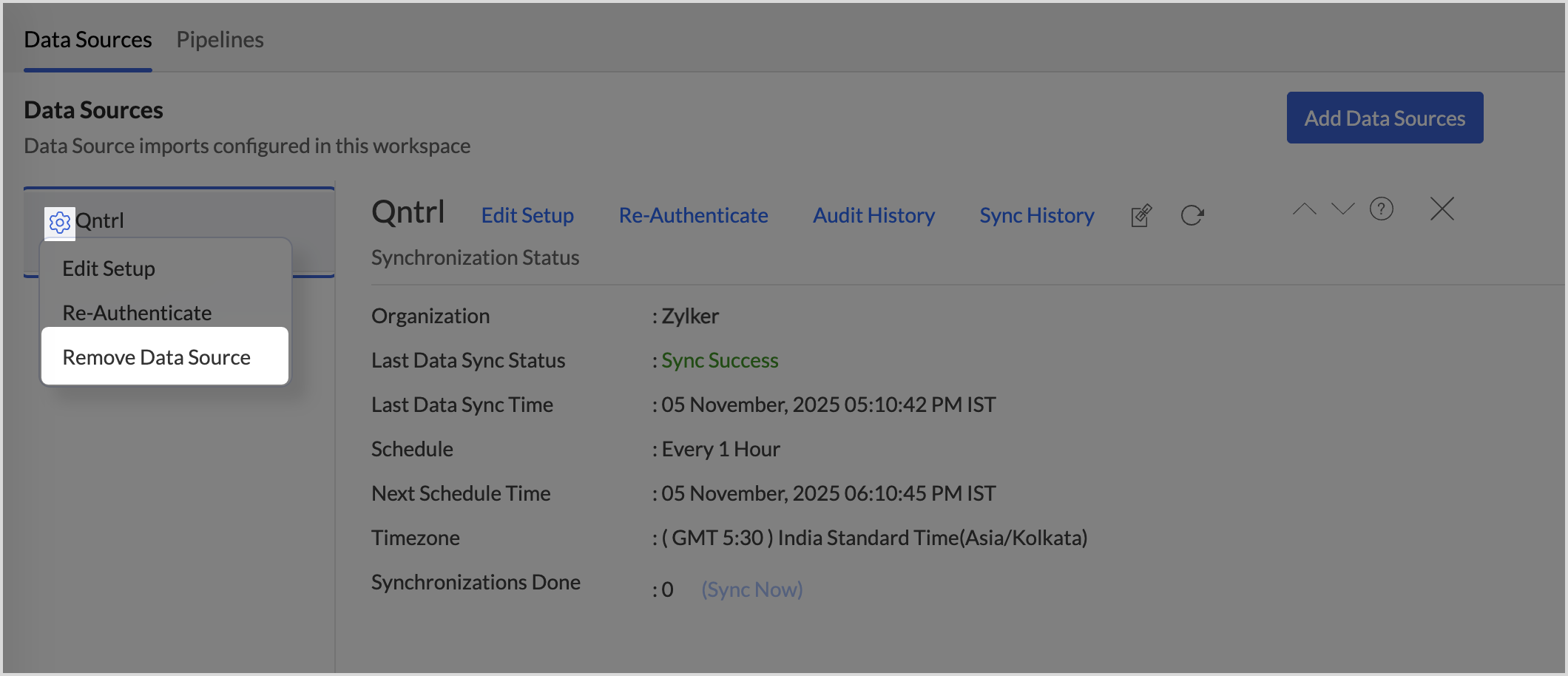
Data Modeling & Preparation
Zoho Analytics allows you to combine data from various sources such as Files, Feeds, Databases, and Business applications for in-depth analysis. Query Tables allow you to combine data from different tables to create reports. The SQL Query Suggester helps to build complex queries.
Zoho Analytics auto identifies similar columns and provides suggestions for lookup while importing. Click here to learn more about joining tables.
Visualize your Qntrl Data
- Zoho Analytics offers a wide range of visualization types to conduct your analysis. Refer to the Creating Reports section to learn more. The chart type primer lists all the viz types available in Zoho Analytics.
- With Predictive analytics, forecast future trends, detect anomalies, and segment data using Cluster analysis.
- Find the What, Why and How behind any outcome with Zia Insights.
Sharing and Collaboration
- Use collaborative reporting and analytics with fine-grained permission control over your shared data and reports with your colleagues & friends.
- Efficiently collaborate with your users by setting up real-time commenting on a shared view.Publish reports for wider consumption.
- Embed reports/dashboards within your websites, web applications, and blogs.
- Export, Email, and Print reports in a variety of formats.Get the mobile apps (optimized for both iOS and Android platforms) and access the reports and dashboards on the go.
Technical Support
We offer 24x5 technical support (Monday to Friday). In case if you need our assistance, kindly do mail us your questions to support@zohoanalytics.com.
You can also reach out to us on our toll-free numbers.
United States: +1 (888) 900 9646
United Kingdom: +44 (20) 35647890
Australia: +61-2-80662898
India: +91-44-6965 6060



